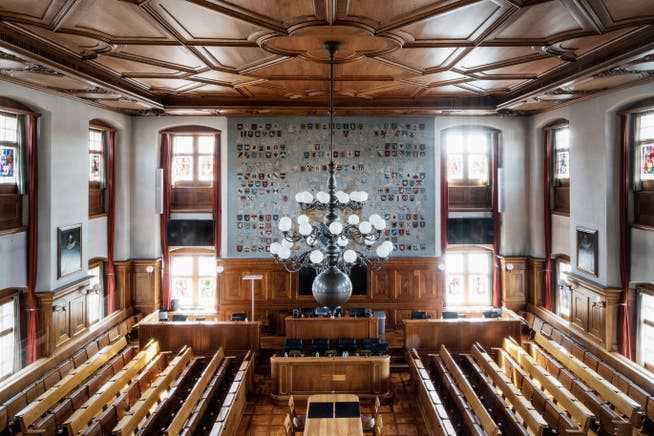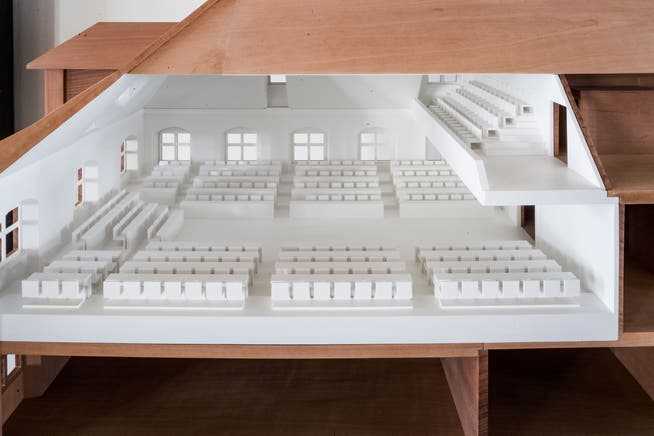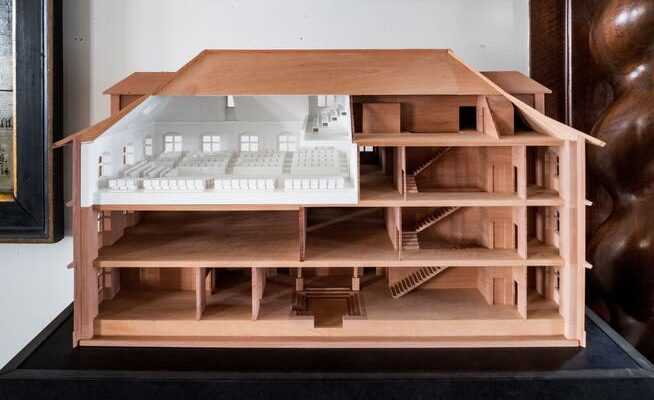In a decision of principle, Parliament clearly spoke out in favor of making the town hall fit for future meetings with the necessary renovation. There is no questioning that.
The council chamber (white) is raised by one floor and expanded into the attic.
There was a lot of talk about tradition awareness on Monday morning in the cantonal council. Also from suitable workplaces. Is it still possible to run Parliament in a modern way in a building that is more than 300 years old? Or does it need a new building? After a lengthy debate, the Zurich cantonal council decided to retain the historic building in the middle of the city of Zurich as the conference venue.
The meetings have been held in the Oerlikon exhibition halls for two years. The end of the pandemic, if it comes in the foreseeable future, will not bring people back from involuntary asylum. Coordinated with the replacement of the vegetable bridge, the town hall urgently needs to be renovated. Therefore, at the beginning of 2023, Parliament will move to the Bullingerkirche in Zurich Aussersihl for several years.
Precarious security
On Monday, the cantonal council was faced with the fundamental decision as to whether it should then return to the town hall; whether the building should not only be renovated, but also equipped for Parliament. Its management approved this with 9 to 7 votes. The basis is a feasibility study presented by building director Martin Neukom (Greens) in February.

The council chamber has occupied the first and second floors since 1831. With the planned intermediate ceiling, the original condition is restored.
Accordingly, it is planned to pull in a ceiling in today’s council chamber. This restores the condition of before 1831. The meetings take place in the room one floor up, which is extended to the roof for this purpose. With these measures, you gain about 25 percent more space in order to remedy the narrow conditions.
The town hall should be more accessible to the public. The newly acquired room on the 1st floor serves as a foyer and can be rented for events. All the technology is renewed, the streaming of sessions introduced during the pandemic remains. For reasons of monument protection, no second exit is planned. An escape staircase is planned inside. An underground tunnel to the neighboring Rathauswache is under investigation.
A no would have been tantamount to planning a new town hall. The SP and the Greens in particular want a “House of Democracy”. On Monday they had to be accused of the fact that the Council had already rejected a corresponding proposal in 2019.
Location for a new building unclear
However, the positions were not completely irreconcilable. Urs Waser (SVP, Langnau am Albis) said on behalf of the management that tradition alone is not enough to hold on to the town hall. Of course, one could plan a new building more generously. Conversely, SP parliamentary group leader Markus Späth (Feuerthalen) conceded that the plans at hand had given the maximum to remain in the town hall.
Critics of the idea of a new building replied that the location was completely unclear, and the costs even more so. In addition to the barracks area and the provisional Globus, Esther Guyer (Greens, Zurich) brought the police barracks into play. A wooden council chamber with a restaurant could be added to it. Markus Bischoff (AL, Zurich) made it clear that the political camps were not entirely united by describing a new building as a dream.
Security in the event of a fire or a robbery, as in 2001 in Zug, played a large part in the debate. Opponents of a return happily mentioned that in an emergency the members of parliament would have to jump out of the window more than 7 meters deep into the Limmat. The other side countered that this was in no way part of the security concept. Martin Neukom, who for once disagreed with the Greens, made it clear that the project met all fire protection regulations.
The perception of the historic town hall is different. Bischoff and the FDP parliamentary group leader, Beatrix Frey, consider it important that parliament continue to meet in the heart of the city of Zurich in the future. For the history teacher Markus Späth, the building, completed in 1698 as the former center of the Ancien Régime, is not a haven of democracy. Qëndresa Hoxha-Sadriu (SP, Opfikon) said she goes to the council to do politics, not to feel the burden of history in a historic building.
Final decision
Since individual members of the SP and the Greens deviated from the party opinion, the decision to return to the town hall was clear with 104 votes against 67.
As a means of remedying the tight conditions, the SVP submitted a motion on Monday that the council should be reduced from 180 to 150 or even fewer members. But it will be dealt with later.
Not only the cantonal council will no longer meet in the town hall before the start of the renovation work. The Zurich municipal council, which is renting from the canton, narrowly rejected a corresponding application a week ago. The decision of the cantonal council to return is final.
In principle, the government council alone could have decided on the renovation of the town hall. However, because the presidency of the cantonal council decides when and where the council meets, it obtained the decision that has now been made. No referendum is possible against this. This also applies to the construction loan, which the government makes a final decision on as a bound issue. It is expected to cost between 20 and 33 million francs. The first debate is expected to take place in the renovated old town hall in 2027.

View of the future council chamber: the new grandstand for the audience at the top right of the model.
Energy Act comes into force after the summer holidays
sho. On Monday, there was a brief new edition of the dispute over the revised energy law, which Zurich voters approved last November. The cantonal council approved the associated ordinance with 97 votes to 45, with 26 abstentions on the part of the FDP. The SVP already rejected the law and now also the implementing regulations. But the FDP, which had vouched for the proposal in 2021, has now criticized some points in the regulation. The complex implementation is going too fast, there is not enough time for the communities and the specialist staff, said Barbara Franzen (FDP, Niederweningen).
Homeowners are interested in the point in time when the general ban on replacing a heating system with a system for fossil fuels applies. Originally, construction director Martin Neukom (Greens) wanted to put the law and ordinance into effect at the beginning of July. Yesterday he explained to the council that, at the request of the municipalities, this would be postponed until after the summer holidays. The government council will set the exact date; the council spoke of September 1st.
